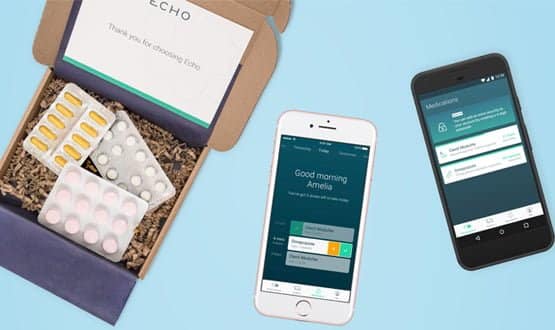Mobile app Echo is supporting medication adherence

An app that electronically reorders medications and arranges for their delivery to a patient’s home is helping users take their medicines correctly, an in-house study has suggested.
Mobile app Echo can request repeat prescriptions from GP practices when a patient runs out of medicine. A study of 3,000 of its users found 83.4% of them were adherent to their prescribed treatment.
The World Health Organization estimates that in developed countries, adherence to long-term therapy for chronic illnesses averages out at about 50%, and NHS England found that wasted medicines cost it about £300 million per year.
As well as enabling users to request medicines when needed, and arranging for delivery to a patient’s home, the app also uses natural language processing to translate medication instructions into reminders.
Stephen Bourke, co-founder of Echo, told Digital Health News that he and his co-founder Sai Lakshmi were “keen to do something with technology, but integrated with the NHS”.
“We took the view of let’s build around the existing platforms and systems, and build something that just works with the existing protocols and workloads within the practice.”
Since November 2016, at least 40,000 people have downloaded the app.
Bourke said the London-based company is speaking with NHS Digital about working on a “deeper integration” with the NHS.
The app was developed due to the founders’ personal frustration with the process of getting repeat medication.
“We both take repeat prescriptions, we both know the problems with the current process, problems with the systems and platforms. And this is an area that really needs addressing because it’s massively inconvenient for us both to get a repeat prescription every month.”
The app also intends to cut down administration time for GP practices, and Bourke described it as “significantly reducing the admin related to appointments”.
In December 2014, a meeting was held by the Academy of Medical Sciences and Faculty of Pharmaceutical Medicine to discuss the issue of patient adherence, with the importance of technology noted.
“Overall, whilst delegates recognised the great potential technology holds in improving adherence to medicines, it was emphasised that it should not be used as a substitute for personal contact between HCPs [healthcare professionals] and patients”, a report from the meeting said.
The participants concluded that technologies such as reminders, automated pill boxes and apps should be utilised, and “these technologies should complement, not substitute, the work of healthcare providers”.
Echo is backed by LocalGlobe, the leading early-stage venture capital fund that previously backed TransferWise, Lovefilm and Zoopla.





2 Comments
Third party ordering “build around the existing platforms and systems” (i.e. a fax) with prescriptions targeting to only one distance selling pharmacy has been proven by many CCGs to massively increase waste not to mention contravenes patient choice. Good effort for trying but as per SB above, doesn’t seem to solve any issues, more mislead re integrations & natural language technology?!
It seems to me that the phrase “NHS England found that wasted medicines cost it about £300 million per year” is misleading within the context of the report. Neither unordered nor uncollected prescription drugs are “wasted”. The wastage surely comes from drugs issued but not used. The app does not appear to address this problem.
Comments are closed.